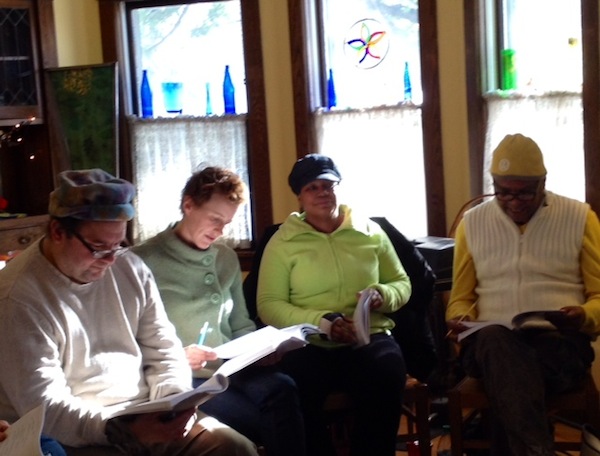
First rehearsal, The Music Man, Ten Thousand Things Theater
By Kira Obolensky, Ten Thousand Things
It’s day two of the polar vortex, which as I understand it is kind of an upside down weather system. The cold that’s supposed to be in polar regions has inverted itself and instead is freezing us. In any case, the church basement where Ten Thousand Things usually rehearses is too cold, so the actors and director for the next production of The Music Man are instead seated in a circle of mismatched chairs in Michelle Hensley’s cozy South Minneapolis living room.
Ten Thousand Thing’s first read through of The Music Man. From left to right, actors Luverne Seifert, Sarah Agnew, Aimee Bryant, Dennis spears
We are reading through the script for the first time together. With the assortment of Ten Thousand Things actors is director Lear de Bessonet, from New York City. (Lear is heading up an exciting initiative at the Public Theater called Public Works, which creates theater with about 200 people from various social and cultural organizations scattered across the five boroughs.) She has directed for Ten Thousand Things before—As You Like it in 2012 and My Fair Lady in 2010, both winter shows. She seems to come to Minnesota only when it’s bitterly cold.
Ten Thousand Things usually starts its rehearsal process with actors and staff sharing stories of excruciating and exhilarating experiences during performances—it’s a way to initiate those actors who have perhaps not had the singular experience of creating work for audiences that range from the incarcerated women at Ramsey County Correctional Facilities, to the crowd on a cold day at Dorothy Day Center, to a well-heeled theater savvy crowd who pays for tickets.
But today, perhaps because everyone in the circle is a veteran performer for the theater, we bypass the initiation and speak to our previous experience with the musical, which is referred to as both a chestnut of the American theater and a candy apple, because the tartness of the core is usually cloaked by a bright, cheerful set. The songs, too, are remarkable in their range and color, and their often bright and memorable lyrics and rhythms (“76 Trombones,” “Till there Was You,” “Pick a Little, Talk a Little.”)
We read the play, which takes place in 1912 in River City, Iowa, during the summer time. It would be overly optimistic to suggest that we are that transported by the script to actually become warmer, but the read through is funny, bright and moving. Afterwards, we begin the process of inverting the play by looking at the inner core of it first—without considering the bright jaunty rhythms of the score, the clever rhyme schemes of the lyrics, the comedy of the situations and characters. We look to the human center of the play.
Lear asks the performers to consider what the stakes of the play are; what the emotional underbelly of the story and its small town setting might be. The thing we all know that day, even as we begin, is that Ten Thousand Things’ interpretation of this play will be different than those other productions that the actors have been in, and indeed most of the other versions of the play that have been performed. The necessities of its production values and its many venues will create a need to strip it down to its essence and in the process, we’ll hear this story anew. The audience, with their range of real life experiences orat least how we imagine them, linger outside our circle that cold day.
We imagine what might prompt a man like Harold Hill to come to a small town to steal money from children; we think about the Paroo family, who has lost the head of their household; the dynamics of gossip in a small town. By looking clearly at the emotional core, we end up stripping away a lot of that candy coating to reveal the urgency of the human needs behind the story, just as we acknowledge the comedy at hand in both the situations and characters of the play. What The Music Man is about, we discover, is the transformation of a community and our path through the next four weeks will involve figuring out what makes this happen.
Recent Content
-
Artsarticle ·
-
Artsarticle ·
-
Artsarticle ·
